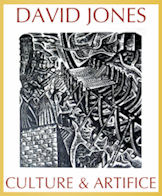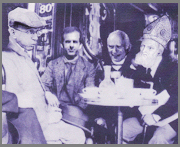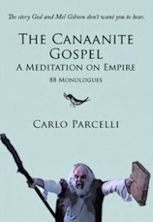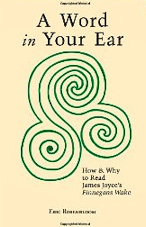
|
|
Spring 2015, Web Issue 17
A multidisciplinary
journal in the
arts and politics

Paintings & Prints
Poetry & Prose
Virtual Facsimiles
Founding Editors:
Joe Brennan
Carlo Parcelli
Contributing Editors:
Bradford Haas
Rosalie Gancie
Cathy Muse
Mark Scroggins
Jim Angelo
Web Editors:
JR Foley
Rosalie Gancie
Nicole Foley
-
from: Paul Celan & the
Meaning of Language
An Interview with Pierre Joris
by Doug Valentine
In that sense Hölderlin’s ideas on translation became important in that I felt that to carry Celan over into English I often had to do violence to English i.e. to write German in English, just as Hölderlin had written “Greek in German.”This is one of the most important aspects of translation: it has to expand, to widen the possibilities of the target language; it is not meant to simply squeeze what is squeezable from the original language into the canonical forms of that language. I hate nothing more than that supposedly laudatory phrase you usually see in a New York Times type book review, usually dismissing translation with the to me lethal compliment according to which “this book reads as if it had been written in English”.
– Pierre Joris
All essays, poetry, fiction, and artwork are copyrighted in the
names of the authors and artists,
to whom all rights revert.

David Jones Conference
March 29 & 30, 2012

J.R. Foley

Carlo Parcelli:
Book / Author page

Wayne Pounds
Book / Author page

The Vorticists at the Restaurant de la Tour Eiffel: Spring, 1915
William Roberts, 1961–2
intro
____________________
|
Doug Valentine
Paul Celan and the Meaning of Language An Interview with Pierre Joris
|

|

|
John Armstrong
The Documentary Poem
|

Jon Woodson Anti-Lynching Poems in the 1930s plus |

|
a digital facsimile of
Welborn Victor Jenkins
A Requiem for the Victims
|
|
and
notes on Rosalie Gancie |

|

|
Robert Coover an excerpt from his new novel
The Brunist Day of Wrath
plus: a review by JR Foley
|
|
Dennis Leroy Kangalee
Fragments, Vol. 1
|

|
|
Francesca Brooks
Jessie Dismorr: Walking and Rewriting London
|

|
|
Magus Magnus
Topology of Books Unread,
Thoughts Revisited
|

|
|
Nina Fleck
Photographs 'Street Hauntings'
|

|

|
Dorothy
Shakespear Pound
Artist
plus
|
|
Shakespear's illustrations for:
|
|
B.C. Windeler
Elimus: A Story With Twelve Designs by D. Shakespear a digital facsimile |

|
|
Dorothy Shakespear Pound Selections from Etruscan Gate (journal entries 1909-1911 and watercolours) |

|
Rod Rosenquist
London, literature and BLAST:
the vorticist as crowd master |
|
Stephen Gatling
Everything at Once; A Hyperkinetic Ode to Pantheism Chapter One and
|

|

|
Joan McCracken
The Green Gloves
|
|
Frank Gatling
|

|
|
Norman Ball
ENRAPTUREMENT the guiltiest pleasure
|

|

|
Carlo Parcelli
With Our Eyes Wide Open: Poems of the New American Century
a review
|

|
Carlo Parcelli
Canus Ictus in Exilium
[Dog Bite in Exile]
Monologue for
|

|
and
Syllogism / Super-Quantophrenia IV ‘Garbage in. Garbage out.’ |
___________________________________
A Few Reference Pages For Vorticism:
Kate Lechmere
Lawrence Atkinson
Jacob Epstein
Jessica Dismorr
...Paintings
Gaudier Brzeska
Alvin Langdon Coburn
Helen Saunders
Edward Wadsworth and Dazzleships
The Female Vorticists - Reference Links
"Wyndham Lewis from 1912"
http://www.flashpointmag.com/Lawrence_Atkinson.htm
http://www.flashpointmag.com/Jacob_Epstein.htm
...Writings
http://www.flashpointmag.com/Jessica_Dismorr_writings.htm
http://www.flashpointmag.com/Jessica_Dismorr_paintings.htm
http://www.flashpointmag.com/Gaudier_Brzeska.htm
http://www.flashpointmag.com/Alvin_Langdon_Coburn.htm
http://www.flashpointmag.com/Helen_Saunders.htm
http://www.flashpointmag.com/blast_dazzleships_wadsworth.htm
http://www.flashpointmag.com/women_vorticists.htm
In this issue...
We open this issue of FlashPøint ...
with historian and poet
Doug Valentine's in-depth interview with Pierre Joris concerning the difficulties and rewards of translating Paul Celan, one of the great poets of the twentieth century. This interview is in conjunction with the release of the second book of translations by Joris of Celan's work, Breathturn into Timestead:
The Collected Later Poetry of Paul Celan.
We then move on to John Armstrong's determined defence and advocacy of
Charles Reznikoff's Documentary Poetic Form.
With the essay
Anti-Lynching Poems in the 1930s, Jon Woodson probes the phenomena that provoked and created these poems as they articulated a self-formation of African-American identity. A striking example of such poetry, as it persisted beyond World War II, is Welborn Victor Jenkins's "The 'Incident' at Monroe: A Requiem for the Victims of July 25th, 1946, Written at the Scene of the Tragedy".
Editor JR Foley continues our FlashPøint #15 tribute to Robert Coover with "7-7-[70]: ARMAGEDDON in a very small space", reviewing The Brunist Day of Wrath to accompany our excerpt from near the beginning of the novel. "Apocalypse," which is ecclesiastical Greek for "revelation," is over-used, much abused, and trivialized, as though the word means "end-of-the-world, etc." (think "Snow-Apocalypse"!). But the incredibly sustained climax of this sequel after nearly 50 years to Coover's prize-winning first novel, The Origin of the Brunists, is apocalyptic in every way you can imagine.
Filmmaker and poet Dennis Leroy Kangalee gives us five dynamic offerings in his unique, authentic voice with Fragments, Vol 1.
In
Jessie Dismorr: Walking and Rewriting London, Francesca Brooks explores the particular significance of Dismorr’s prose writings in Blast and their relation to the feminist and metropolitan cultures of her day.
Magus Magnus offers us a rich, philosophical meditation on the ouroboros in
Topology of Books Unread, Thoughts Revisited.
Nina Fleck shares a photographic documentation of her responses to the world around her, in much the same way as Jessica Dismorr did with her writings about London and artwork for BLAST with
Nina Fleck Photographs: 'Street Hauntings'.
The various events marking Blast's 100th anniversary brought renewed attention to
Dorothy Shakespear Pound as a contributing Vorticist artist. In this issue we post an online digital facsimile of the 1923 work by B.C. Windeler called Elimus: A Story With Twelve Designs by D. Shakespear. Elimus includes 12 vorticist inspired works by Shakespear.
On a separate page we include selections from Shakespear’s
Etruscan Gate (1972) which incudes fragments of her diaries from 1910-11 along with additional artworks and watercolours.
We also republish Rod Rosenquist's reconsideration of one of the first High Modernists, Wyndham Lewis in Rosenquist's essay from FlashPøint 6, London, Literature, and BLAST: The Vorticist as Crowd Master. Rosenquist also covers Lewis’s Vorticist colleague Jessica Dismorr.
Next we have two hyper-kinetic offerings from Stephen Gatling
Everything at Once; A Hyperkinetic Ode to Pantheism, Chapter One and An Irishman's Indignation.
With "The Green Gloves" Joan McCracken adds an early passage to her tale of Miriam, excerpted in several issues of FlashPøint.
Frank Gatling gives us three excerpts from his longer work Vague Terrain.
Next we reprise a 2008 article on the state of US politics and culture by Norman Ball
ENRAPTUREMENT: The Guiltiest Pleasure.
Moving along we have Carlo Parcelli's review of Doug Valentine's grim anthology of witness poetry, With Our Eyes Wide Open:Poems of the New American Century.
Next, the exiled Roman cynic Philosopher Canus Ictus is brought to life by Carlo Parcelli in this first installment of Canus Ictus in Exilium, [Dog Bite in Exile].
And finally we have the fourth installment of Mr. Parcelli's book length philosophical work Syllogism / Super-Quantophrenia IV.
'Garbage in. Garbage out.'
We are eager to hear from you, especially about this issue, so please tell us what you think: flashpnt@hotmail.com!




